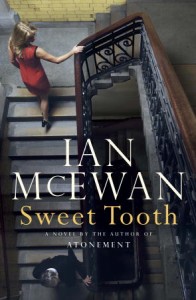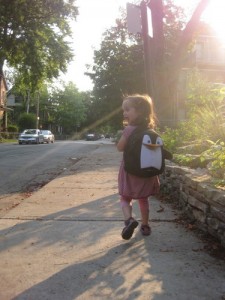September 11, 2012
The Art and Business of Blogging: Fall 2012
 I teach The Art and Business of Blogging at the University of Toronto School of Continuing Studies, and the next session starts on October 2, running for 9 weeks. Here’s the syllabus from last year, if you want an idea of what we’ll be working on. I’m looking forward to it and hoping for a big class of enthusiastic and inquisitive students. Please do spread the word!
I teach The Art and Business of Blogging at the University of Toronto School of Continuing Studies, and the next session starts on October 2, running for 9 weeks. Here’s the syllabus from last year, if you want an idea of what we’ll be working on. I’m looking forward to it and hoping for a big class of enthusiastic and inquisitive students. Please do spread the word!
September 10, 2012
When this is all over…
 The latest in a series of strange objects I’ve found in the road, and actually on the same block as the “another Belfast man doing well” post-it. The story behind this one is even harder to discern, however. It’s actually a broken piece of plaster, painted on one side with a message etched in Sharpie with dubious grammar. I have this feeling it’s leftover from frosh week, as we live close to the university, and in that context, it makes total sense to me. I remember hating frosh week and hating so much about university as an institution, how adulthood was still so elusive, and how the bright spots in my world were a handful of kindred spirits. I probably would have written such a note to any of them, probably not on a piece of broken plaster, but perhaps it was the only surface available. I love how this broken piece of plaster manages to express the same love and longing of The Beach Boys’ Wouldn’t It Be Nice. Though I wonder how it ended up in the road, if the longing was unrequited, and the plaque’s recipient had had plans to get an apartment with another person altogether…
The latest in a series of strange objects I’ve found in the road, and actually on the same block as the “another Belfast man doing well” post-it. The story behind this one is even harder to discern, however. It’s actually a broken piece of plaster, painted on one side with a message etched in Sharpie with dubious grammar. I have this feeling it’s leftover from frosh week, as we live close to the university, and in that context, it makes total sense to me. I remember hating frosh week and hating so much about university as an institution, how adulthood was still so elusive, and how the bright spots in my world were a handful of kindred spirits. I probably would have written such a note to any of them, probably not on a piece of broken plaster, but perhaps it was the only surface available. I love how this broken piece of plaster manages to express the same love and longing of The Beach Boys’ Wouldn’t It Be Nice. Though I wonder how it ended up in the road, if the longing was unrequited, and the plaque’s recipient had had plans to get an apartment with another person altogether…
September 9, 2012
Sweet Tooth by Ian McEwan
 I kept getting lost in Ian McEwan’s latest novel Sweet Tooth, and not necessarily in a good way. It is 1972, and after obtaining a substandard degree in mathematics from Cambridge, Serena Frome is recruited to MI5. Her pretty blonde head is just skimming the glass ceiling as she sits down to undertake her entry-level job, mainly filing. At one point, she and a colleague are assigned an undercover job posing as cleaning ladies in order to be… actual cleaning ladies, tidying up a safe house. McEwan shows the systemic discrimination against women in the civil service at the time, and also paints a broad picture of the social and political background– miners’ strikes, coal shortages, political strife, violence in Ireland and terrorism at home.
I kept getting lost in Ian McEwan’s latest novel Sweet Tooth, and not necessarily in a good way. It is 1972, and after obtaining a substandard degree in mathematics from Cambridge, Serena Frome is recruited to MI5. Her pretty blonde head is just skimming the glass ceiling as she sits down to undertake her entry-level job, mainly filing. At one point, she and a colleague are assigned an undercover job posing as cleaning ladies in order to be… actual cleaning ladies, tidying up a safe house. McEwan shows the systemic discrimination against women in the civil service at the time, and also paints a broad picture of the social and political background– miners’ strikes, coal shortages, political strife, violence in Ireland and terrorism at home.
The two things about Serena Frome are that she is pretty and she likes to read. She reads novels, nothing too challenging or avant-garde. “And I suppose I was, in my mindless way, looking for something, a version of myself, a heroine I could slip inside as one might a pair of old shoes.” She tells us, “Novels without female characters were a lifeless desert.” Her favourite authors are also my own, Margaret Drabble, Elizabeth Bowen. She read Doris Lessing, Iris Murdoch, speedily, skimming surfaces, absorbing whole paragraphs in a glance.
Serena’s good looks and knowledge of contemporary literature are put to use when she’s taken off her desk and assigned to Sweet Tooth, a secret project designed to foster literature that’s anti-communist in its nature. Serena is sent to Brighton to meet a promising young writer called Tom Haley and to sign him on, though he’s made to think his funding is coming from an unremarkable arts body instead of MI5. Naturally, the two fall in love, and Serena is forced to keep up the plot, though she’s not sure how long she’ll be able to perpetuate her story. Amidst all this is paragraph-upon-paragraph of indecipherable spy business, as well as huge chunks of Haley’s stories, which make reading the novel disorienting and frustrating at times.
Doubly frustrating was the character of Serena, who was drawn as such an idiot that I wondered if and why McEwan was so determined to insult his female readers (or just the ones who read like she and I do). What kind of narrator begins a sentence with, “With a pearly pink painted nail I tapped lightly on the door…”? Solopsistic to the point of blindness, frivolous and stupid, Serena was most uncompelling. So too was the novel’s plot which hinged on implausibilities and unbelievable conclusions. Several times, I wasn’t really sure if Sweet Tooth was worth sticking with.
Sweet Tooth has received widely mixed reviews, and your own take will probably depend on how you interpret the novel’s final chapter which reveals a whole new layer of depth to the narrative (and the sort of trickery McEwan displayed at the end of Atonement). On one level, the trickery is slightly annoying, and yet suddenly the reader understands why Serena Frome is such a lacklustre, two-dimensional character, and why the novel twists and turns with such amateurism. The whole project suddenly makes sense, and that’s interesting, even redeeming, but it doesn’t change the fact that the reader had to endure such a crummy book to get the point.
I read once that a reader’s first Ian McEwen novel is always her best, and that’s been the case with me. I will never forget how captivated I was by Saturday, how I had to skip ahead to the end to discover how it all turned out because otherwise, I might have gone into cardiac arrest. I’ve enjoyed others since, but there’s always been something lacking, as was the case here. There is so much to like about Sweet Tooth, the parallels between espionage and fiction-writing (“In this work, the line between what people imagine and what’s actually the case can get very blurred. You imagine things– and you can make them come true”), its insights on story-building, depiction of a post-swinging London, and a marvelous character called Shirley Shilling (“whose alliterative name in the dependable old currency caught something of her plump lop-sided smile and old-fashioned taste for fun”).
In the end, I am glad I persevered with the novel, but this was a book too clever for its boots. I do wish Ian McEwan could pull off a more substantial literary feat than the old, “Look Ma, no hands!”.
September 7, 2012
First Day
 I’ve been struggling all week with Ian McEwan, been hard at work on a couple of wonderful projects, and occupied by playschool prep and a dinner party. I did do a short interview with Kyo Maclear at 49thShelf, so I have something to show for my week at least. And Harriet started playschool this morning, and we’re so proud of her. Drop-off went without a hitch, and I think she’s going to have a wonderful time.
I’ve been struggling all week with Ian McEwan, been hard at work on a couple of wonderful projects, and occupied by playschool prep and a dinner party. I did do a short interview with Kyo Maclear at 49thShelf, so I have something to show for my week at least. And Harriet started playschool this morning, and we’re so proud of her. Drop-off went without a hitch, and I think she’s going to have a wonderful time.
September 5, 2012
All the Anxious Girls on Earth by Zsuzsi Gartner
 Last week, I couldn’t focus, and suffered that “couldn’t get into it” reading affliction that you hear about so often. I don’t know if the problem was the books’ or mine, but regardless, there was no hope until I turned to my to-be-read/not-new-releases shelf and picked up All the Anxious Girls on Earth by Zsuzsi Gartner (whose Better Living Through Plastic Explosives had been so admired by both me and Giller Prize judges last year). And suddenly, the world was steady again.
Last week, I couldn’t focus, and suffered that “couldn’t get into it” reading affliction that you hear about so often. I don’t know if the problem was the books’ or mine, but regardless, there was no hope until I turned to my to-be-read/not-new-releases shelf and picked up All the Anxious Girls on Earth by Zsuzsi Gartner (whose Better Living Through Plastic Explosives had been so admired by both me and Giller Prize judges last year). And suddenly, the world was steady again.
Except, of course, that it most definitely wasn’t. As with her second, Gartner’s first book of short stories is rife with explosions, decay and unsteady earth beneath our feet. It’s that same dystopian Vancouver which looks suspiciously like reality (and sometimes it’s also Toronto). There is weirdness (a woman swims in her mother’s womb with a fetus who’s a brother long ago stillborn) , and humour (another woman programs a film festival and has to content with terrible would-be filmmakers showing up at her door– “I made that film about the dude who goes through all this bad shit and then wakes up and finds out it was all just a dream… Just watch it backwards.”), and violence (when the woman who threatens to set herself on fire if her film isn’t programmed [“Her eyes were a living room of despair, full of mismatched furniture and candles stuck in Chianti bottles, dripping all over the place, a syringe under the wicker chair, a Ouija board on the coffee table.”] follows through with her threat).
It’s possible that short stories were just what I needed, albeit good ones meticulously curated into a seamless collection. A book to sink in and out of, which was about all the attention I could muster at the time. And the vision, the writing! “Lewis worked in a place that looked like a cheese shop but sold soap. A cosmetic deli.” Sentences that jumped off the page, treasures themselves. I also appreciated the many connections between All the Anxious Girls and Better Living, the evolution of Gartner’s preoccupations, how the latter is an extension of the former and they illuminate each other. I’m fascinated in particular with Gartner’s treatment of terrorism, an idea whose definition took on radically new proportions in the time between her books. How has a changing world changed what she’s writing about?
Yesterday, the Giller Prize longlist was revealed, and though people are careful to be polite about these things, the list bowled me over with its unremarkableness. And yes, excellence means different things to different people, and what this prize is all about will change every year depending on the jury in question. But I was disappointed by this list because it’s been a stunning year for Canadian literature and not one of the books I’ve loved best made it into the spotlight. There are a few exceptions, but for the most part, I’ll never read any of the nominated books, and no amount of acclaim will ever change that. How glad I am that I know my own mind (and the terrible books that knowledge will same me from!). Though it occurs to me, as it did last year, that perhaps I live too deeply in my own bookish bubble to pay much attention to prize lists anyway. I’m buying books all the time, so I’m not who Giller is trying to woo. Further, I’ve got so many books to be read that I’d be reading into the next year or two with what’s lined up already, so in a way, prize lists are just a distraction. Perhaps it’s a blessing that a list like this is so incredibly easy to tune out.
The point of all this being that there is such tremendous pressure to keep on top of new releases, to read even the books that don’t interest one much. And that tuning out from that buzz can be such a liberation. If any of the Giller longlisted titles are truly for the ages, then I look forward to getting around to them in a decade or so, when it will be like the discovery of something quite precious.
- Check out my Anxious Girls reading list here.
September 3, 2012
Summerlong
 I’ve been trying to think of a way to write this post through a bookish prism, but we’ve had a busy long weekend and I’m so satisfyingly spent. So I’ll give it to you straight instead: we’ve had the most delightful summer. A summer that began in May when the glorious weather arrived. We had an excellent week with our UK grandparents in town, which involved all kinds of local fun. Harriet turned 3 with the grandest dinosaur party in recent memory. Our new friend Lilia was born, and so we’ve had regular treks down to Queen & Gladstone all summer long to visit her. We’ve had weekend roadtrips in our Fiat 500, when the sun was always shining and the sky was so so blue. In June, we celebrated my birthday, 7 years of marriage, and Father’s Day in one super-festive week. The best day out every to Toronto Island at the beginning of July, Harriet finally big enough that we can skip a nap or two and embrace a day in all its fullness. We spent a fantastic weekend in Peterborough, having much fun with more grandparents, enjoying in particular running through sprinklers and watching boats in the locks. Our cottage week away, so purely good, with so much reading, swimming, shoelessness, and being tuned out from the world. The next weekend, Stuart and I took off on a road trip of our own to watch our good friends get married and to delight in being a couple.
I’ve been trying to think of a way to write this post through a bookish prism, but we’ve had a busy long weekend and I’m so satisfyingly spent. So I’ll give it to you straight instead: we’ve had the most delightful summer. A summer that began in May when the glorious weather arrived. We had an excellent week with our UK grandparents in town, which involved all kinds of local fun. Harriet turned 3 with the grandest dinosaur party in recent memory. Our new friend Lilia was born, and so we’ve had regular treks down to Queen & Gladstone all summer long to visit her. We’ve had weekend roadtrips in our Fiat 500, when the sun was always shining and the sky was so so blue. In June, we celebrated my birthday, 7 years of marriage, and Father’s Day in one super-festive week. The best day out every to Toronto Island at the beginning of July, Harriet finally big enough that we can skip a nap or two and embrace a day in all its fullness. We spent a fantastic weekend in Peterborough, having much fun with more grandparents, enjoying in particular running through sprinklers and watching boats in the locks. Our cottage week away, so purely good, with so much reading, swimming, shoelessness, and being tuned out from the world. The next weekend, Stuart and I took off on a road trip of our own to watch our good friends get married and to delight in being a couple.
Oh, there have been the Kensington Market Saturday mornings, fun at Dufferin Grove Park, street festivals of all kinds, Trinity Bellwoods goodness, swimming at Christie Pits, wading pool hijinks, numerous Book City errands, brunches, lunches and dinners out, and deliciousness courtesy of the new barbeque we bought back in May. Little time between visits to Sweet Fantasies for ice cream. The joy of dinner on our beautiful porch. Pizza with tomatoes and basil from the garden, farmers market fare, fresh berries, strawberry picking with friends back in June, baking pie even though it’s hot, never ever running out of freezies.
What a delightful summer it has been, cruising the city sans stroller, that little hand in mine, and no longer having to worry about such things as diapers, baby-food, and sleeplessness. No drama, angst or fretting, well, except for when Harriet was terrible, but we don’t even worry about this so much. The weather has been glorious. It’s true, a few days that were ridiculously hot, but more days that were absolutely perfect. I’ve never seen so much blue sky. I was only ever bored at a playground a handful of times. We have had the most splendid company.
Harriet starts playschool this week, which makes this the first real September we’ve experienced in years. It also marks a real shift, out of the house first thing in the morning, and time for me to work while the sun is up, which is tremendously exciting. And while I am of quite mixed emotions about Harriet starting school, I find myself less troubled by the end of summer than I normally am. I am not sure why, except that perhaps we’ve just spent it so well.
We went to the CNE yesterday, a new tradition we started last year. It was a fantastic day, though we were so tired by the end that we could barely walk home from the subway station. And I like our new tradition, an occasion that makes the end of the summer something to look forward to. Or perhaps I just like having something to look forward to. Perpetually. I would make a terrible Buddhist.
Because while I know that living in the moment is what we should all be aspiring to, sometimes I wonder what’s so wrong with looking forward. Moments pass so quick, time doesn’t stop, so why not just give in to that, and there is always something wonderful coming up next anyway. And I wonder if the real trick is just to keep something wonderful coming up next anyway. But then that’s a trick that’s probably easiest to pull off in the summer.






